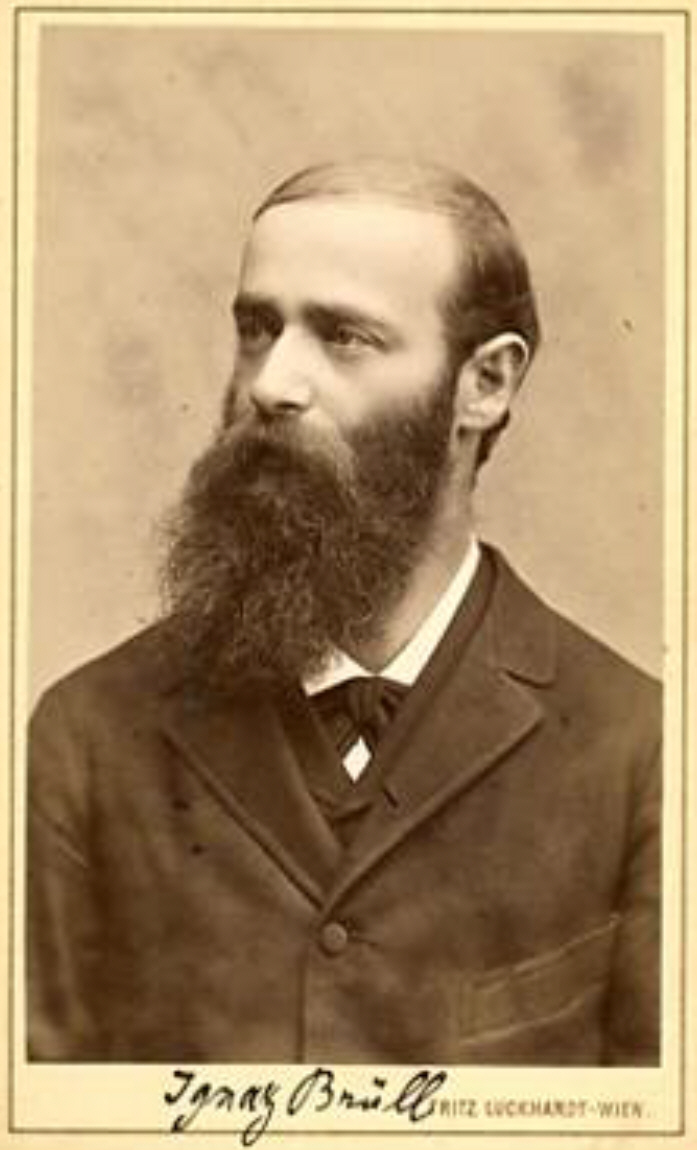- Profession: Composer, pianist, pedagogue
- Relation to Mahler: Also pupil of Julius Epstein (1832-1926)
- Correspondence with Mahler:
- Born: 07-11-1846 Prostejov (Proßnitz), Moravia.
- Died: 17-09-1907 Vienna, Austria. Aged 60.
- Buried: 00-00-0000 ?
Mentioned in diary Natalie Bauer-Lechner (1858-1921).
Ignaz Brüll was a Moravian-born pianist and composer who lived and worked in Vienna.
His operatic compositions included Das goldene Kreuz (The Golden Cross), which became a repertory work for several decades after its first production in 1875, but eventually fell into neglect after being banned by the Nazis because of Brüll’s Jewish origins. He also wrote a small corpus of finely crafted works for the concert hall and recitals. Brüll’s compositional style was lively but unabashedly conservative, in the vein of Mendelssohn and Schumann.
Brüll was also highly regarded as a sensitive concert pianist. Johannes Brahms regularly wanted Brüll to be his partner in private performances of four-hand piano duet arrangements of his latest works. Indeed, Brüll was a prominent member of Brahms’s circle of musical and literary friends, many of whom he and his wife frequently entertained.
Brüll was born in Prostejov (Proßnitz) in Moravia, the eldest son of Katharina Schreiber and Siegmund Brüll. His parents were prosperous Jewish merchants and keen social musicians; his mother played piano and his father (who was closely related to the Talmudic scholar Nehemiah Brüll) sang baritone. In 1848 the family relocated their business to Vienna, where Brüll lived and worked for the rest of his life.
Brüll started learning piano from his mother around the age of eight and he quickly showed talent. Despite being the heir to the family business, his promise at the keyboard encouraged his parents to provide him with a serious musical training. By the age of ten, he was taking piano lessons from Julius Epstein (1832-1926), a professor at the Vienna Conservatory and friend of Johannes Brahms (1833-1897). A year later, in 1857, he began studying composition with Johann Rufinatscha; instrument instruction followed with Felix Otto Dessoff.
In 1860, while aged fourteen, Brüll started writing his Piano Concerto No. 1, which received its first public performance the following year in Vienna with Epstein as soloist. Further encouragement to pursue a musical career came with endorsement from the distinguished pianist-composer Anton Rubinstein.
Brüll scored another success with his Serenade No. 1 for Orchestra, which was premiered in Stuttgart in 1864. By now, Brüll was 18 years old and had just finished composing his first opera score, Die Bettler von Samarkand (The Beggars of Samarkand). Unfortunately, plans for a production at the Court Theatre in Stuttgart in 1866 failed to materialize, and the work was apparently never played.
By contrast, Brüll’s second opera, Das goldene Kreuz (The Golden Cross), was by far his most successful: it held a place in the repertory for several decades and brought its composer into the public eye almost overnight. At its premiere in Berlin in December 1875, Brüll was personally complimented by the emperor, Wilhelm I. The opera, with a libretto by Salomon Hermann Mosenthal based on a story by Mélesville, involves an emotional drama of mistaken identities during the Napoleonic wars.
In 1872 he was appointed professor at the Horak Institute in Vienna.
In parallel, Brüll had also been pursuing a career as a concert pianist, playing as a popular soloist and recitalist throughout the German speaking countries. The London premiere of Das goldene Kreuz, in an 1878 production by the Carl Rosa Opera Company, coincided with the first of two extensive concert tours of England, during which he was able to play his Piano Concerto No. 2 (another youthful work, written in 1868) and arrange performances of some of his other pieces. Brüll also toured with George Henschel.
In 1882, Brüll married Marie Schosberg, a banker’s daughter who became a popular hostess to Viennese musical and artistic society. Brüll now shifted his attention towards composition, reduced the number of concert engagements, and permanently gave up touring. He also found himself playing host to Johannes Brahms’s circle of friends, including the powerful music critic Eduard Hanslick, the musically minded eminent surgeon Theodor Billroth, and composers such as Carl Goldmark, Robert Fuchs, and Gustav Mahler (1860-1911). When Brahms wanted to audition his latest orchestral compositions, as was his habit, to a select group of connoisseurs in four-handed versions for two pianos, Brüll regularly played alongside the senior composer. From 1890, Brüll’s new holiday home (the Berghof) in Unterach am Attersee also became a social venue.
Unlike Brahms, Brüll was a man of the theatre, and he went on to compose at least seven more operas, which however did not approach the same level of popular success as Das goldene Kreuz. His final opera, the two-act comedy Der Hussar, was well received when it was staged in Vienna in 1898.
Brüll was an honorary British consul at Budapest and was appointed an Honorary Companion of the Order of St Michael and St George in the 1902 Coronation Honours list on 26-06-1902.
More
Hermine Brüll Schwarz, Ignaz Brüll und sein Freundeskreis: Erinnerungen an Brüll, Goldmark und Brahms (Vienna: Rikola Verlag, 1922).



